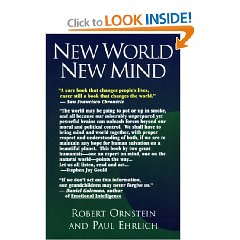This superb book was published in 1989 and is being reissued, and I am very glad it has come out again. I bought it because it was recommended by Tom Atlee, seer of the Co-Intelligence Institute, and I found it very worthwhile.
As I reflect on the book, I appreciate two key points from the book:
1) The evolution of our brains and our ability to sense cataclysmic change that takes place over long periods of time is simply not going fast enough–the only thing that can make a difference is accelerated cultural evolution, which I find quite fascinating, because cultural evolution as the authors describe it harkens to noosphere, World Brain, co-intelligence, and what the Swedes are calling M4 IS: multinational, multiagency, multidisciplinary, multidomain information sharing–what I think of as Open Source Intelligence–personal, public, & political.
2) One of the more compelling points the authors make is that not only are politicians being elected and rewarded on the basis of short-term decisions that are by many measures intellectually, morally, and financially corrupt, but the so-called knowledge workers–the scientists, engineers, and others who should be “blowing the whistle,” are so specialized that there is a real lack of integrative knowledge. I realized toward the end of the book, page 248 exactly, that Knowledge Integration & Information Sharing must become the new norm.
This is a tremendous book that is loaded with gems of insight. I have it heavily marked up. Although it integrates and reminds me of ideas ably explored in other books, such as Health of Nations, Cultural Creatives, Clock of the Long Now, ATTENTION, Limits to Growth, and Forbidden Knowledge, these two authors have integrated their “brief” in a very readable way–as one person says on the book jacket, they effectively weave together many strands of knowledge.
The annotated bibliography is quite good, and causes me to be disappointed that the publishers did not provide for the updating of the bibliography–the ideas being blended are timeless and need no update.
Two notes toward the end were quite interesting. They speculate that Japan may be the first modern nation to collapse, if it is subject to disruption of the global trade and transportation system. They also have high praise for Global 2000, an integrative work whose predictions for the 2000 period (written in the 1970's, I believe) are turning out to be quite accurate.
Finally, woven throughout the book, is the simple fact that we are now burning up our savings–consuming the Earth at a much faster rate than it can replenish itself. We are very much out of harmony with our sustaining environment, and at grave risk of self-destruction. Interestingly, they remind of the Durants last word in “The Lessons of History:” that the only revolution, the only sustainable revolution, is that which takes place in the human mind. As these authors would have it, if we do not develop a new collective mind capable of integrating, understanding, and acting sensible, for the long term, on what we can know as a collective mind, then our grandchildren will become prey for the cockroaches of the future.
At a time when the new Director of National Intelligence (DNI), Ambassador Negroponte, is seriously contemplating the establishment of a national Open Source (Information) Agency as recommended by the 9-11 Commission, to get a grip on all the historical and current knowledge, both scientific and social, that we have lost touch with, I can think of just three books I would recommend to the DNI as a foundation for his reflections: this one, Buckman's “Creating a Knowledge Driven Organization,” and Wheatley's “Leadership and the New Science.” I would end his tutorial, or perhaps inspire it, by screening Tom Atlee's video, “From Group Magic to a Wise Democracy.”
Strangely, for I tend to be very gloomy about our prospects these days, I find that this book has cheered me somewhat. I sense the possibility of a break-out through a combination of wise information acquisition and sharing policies, and the application of the new technologies that L-3, CISCO, and IBM, among others, are bringing out, technologies that put intelligence on the edge of the network, and permit the creation of infinitely scalable and shareable synthetic information exactly suited to any need at any level.
There *is* an answer to all that ails us, and these two authors discuss it in a very capable manner.
See also, with reviews:
Integral Consciousness and the Future of Evolution
The Tao of Democracy: Using Co-Intelligence to Create a World That Works for All
The Cultural Creatives: How 50 Million People Are Changing the World
Group Genius: The Creative Power of Collaboration
The Wealth of Networks: How Social Production Transforms Markets and Freedom
Global Brain: The Evolution of Mass Mind from the Big Bang to the 21st Century
World brain
Leadership and the New Science: Discovering Order in a Chaotic World
The World Cafe: Shaping Our Futures Through Conversations That Matter
THE SMART NATION ACT: Public Intelligence in the Public Interest





